Unit 5 Let’s celebrate Welcome to the unit 课件30张
文档属性
| 名称 | Unit 5 Let’s celebrate Welcome to the unit 课件30张 |
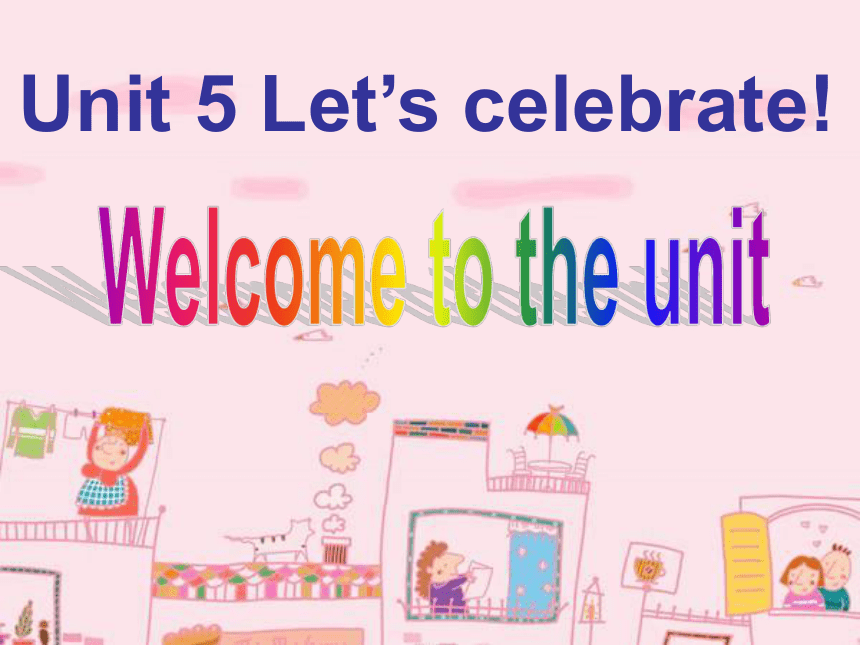
|
|
| 格式 | pptx | ||
| 文件大小 | 8.0MB | ||
| 资源类型 | 教案 | ||
| 版本资源 | 牛津译林版 | ||
| 科目 | 英语 | ||
| 更新时间 | 2020-11-09 00:00:00 | ||
图片预览

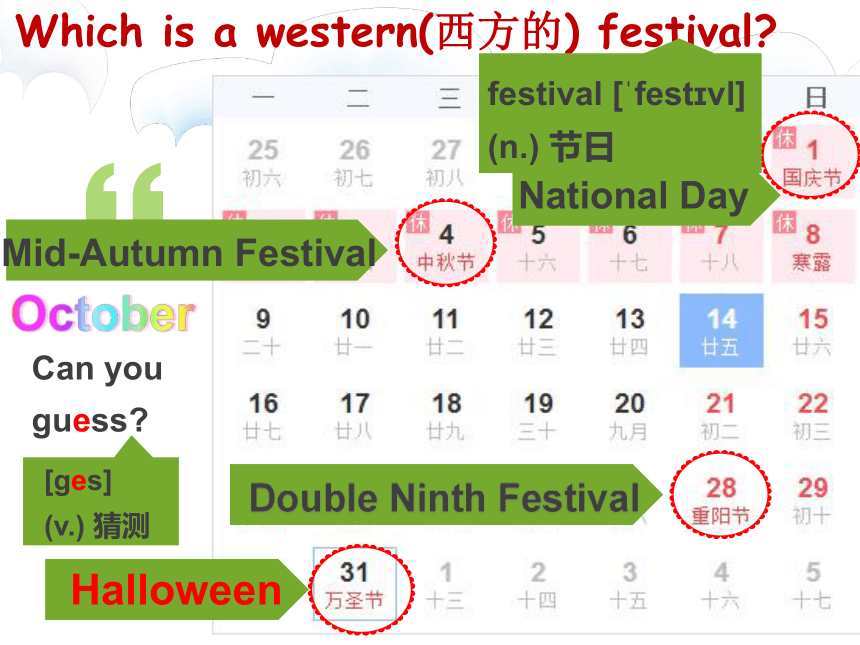
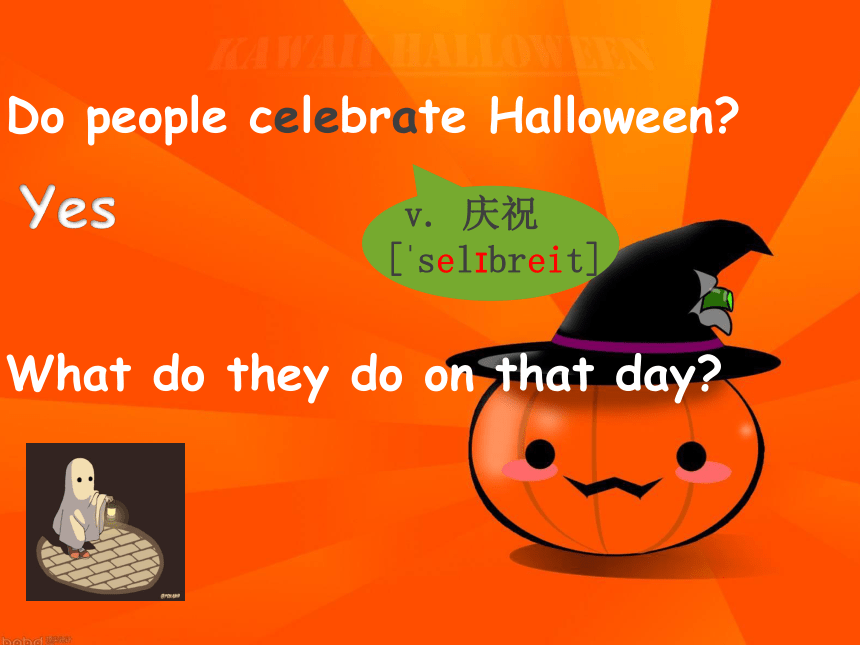
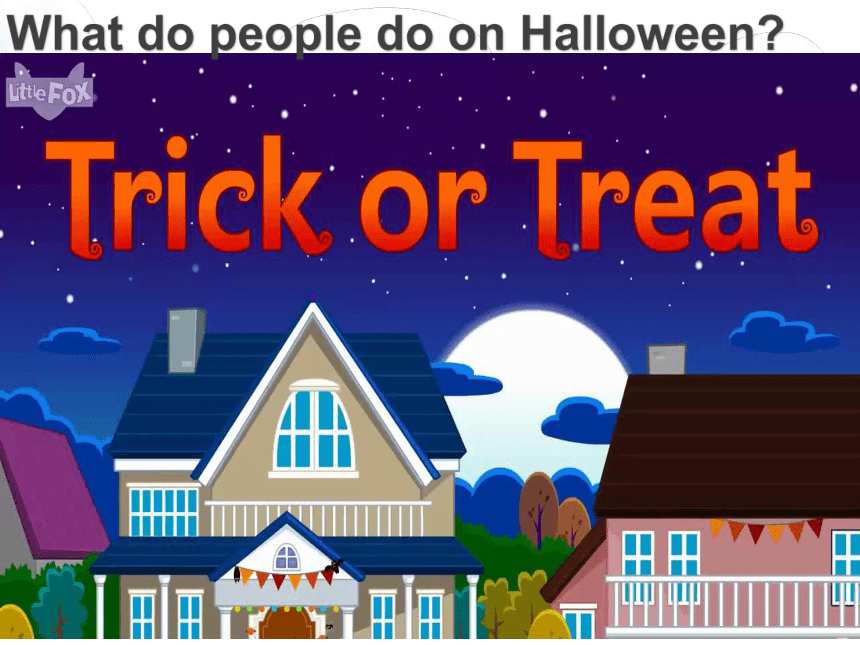
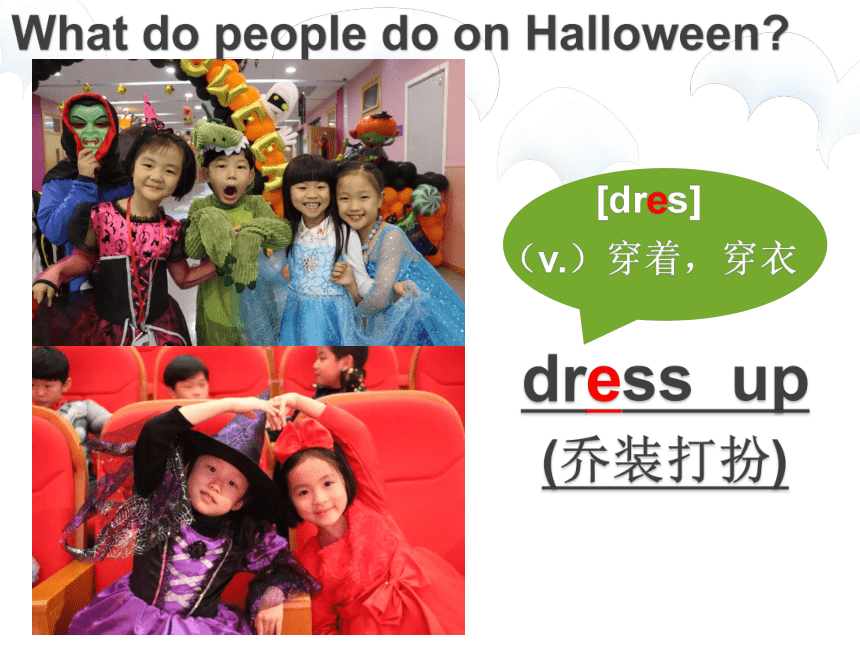
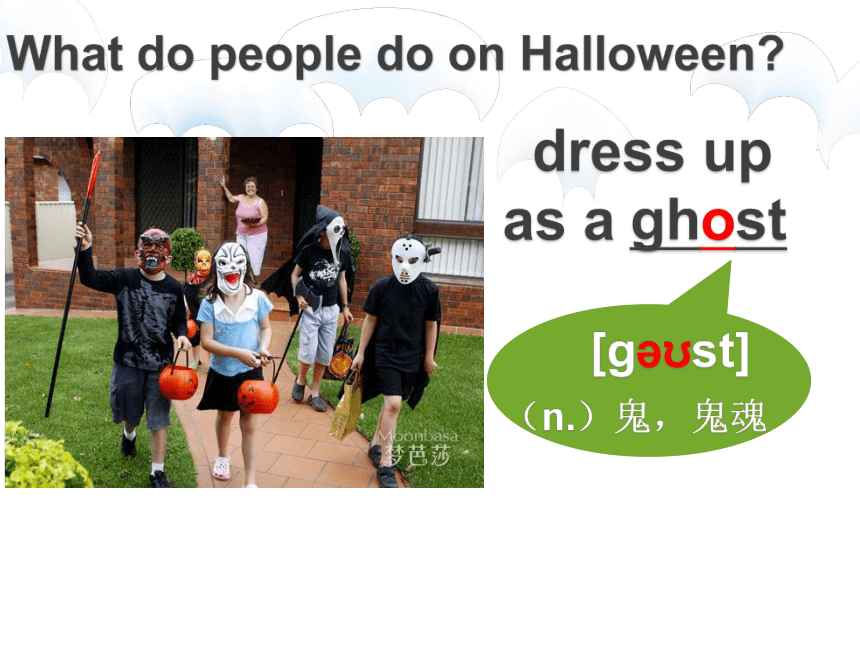
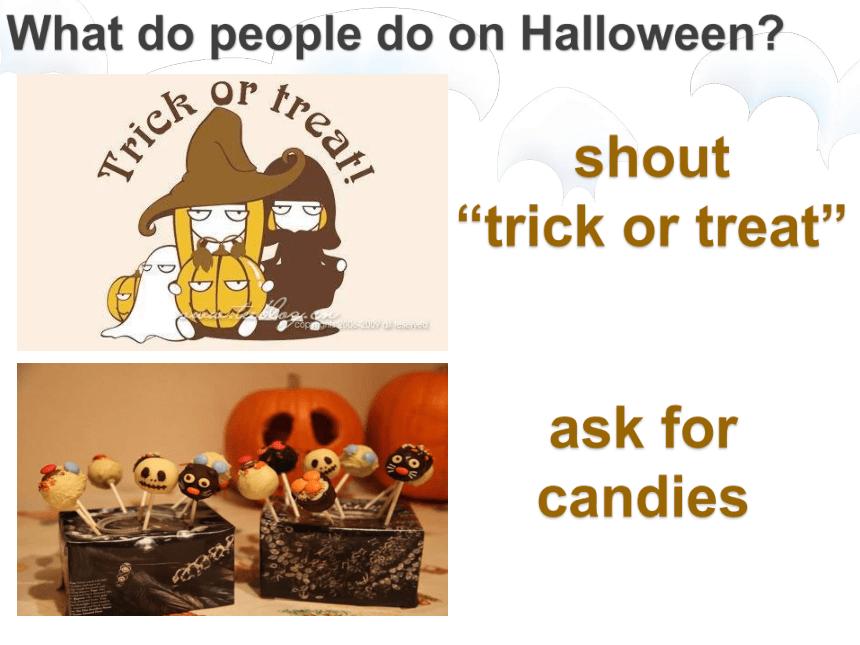
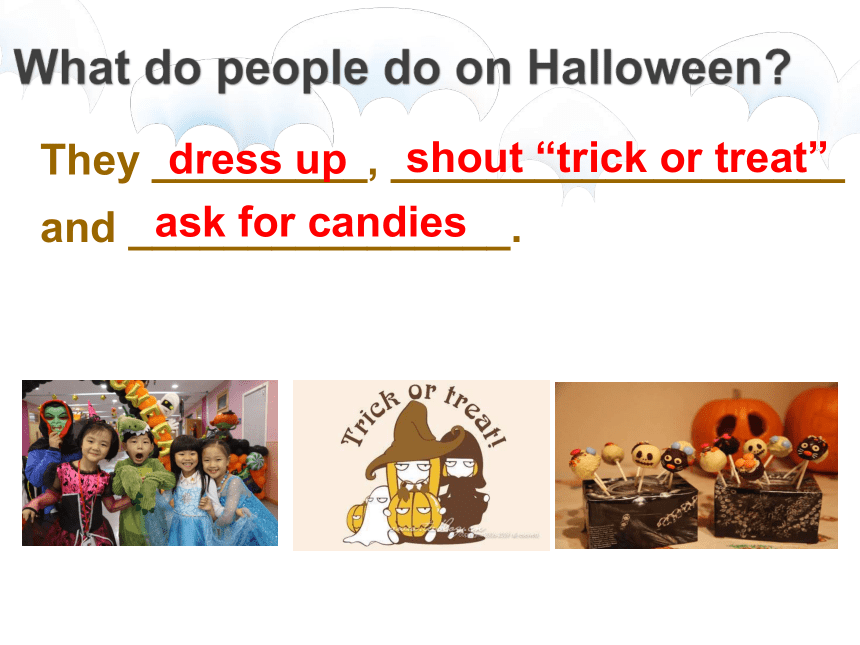
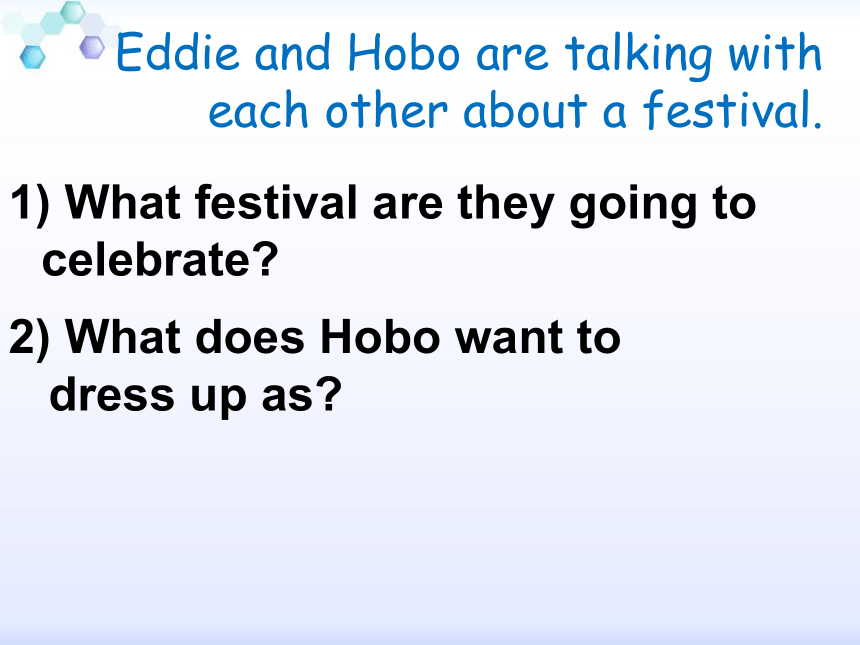
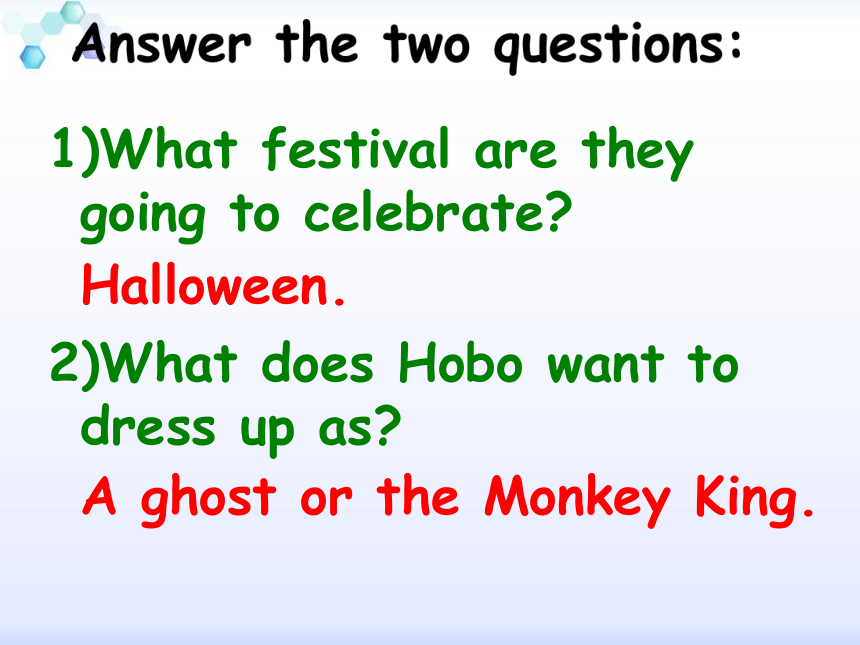

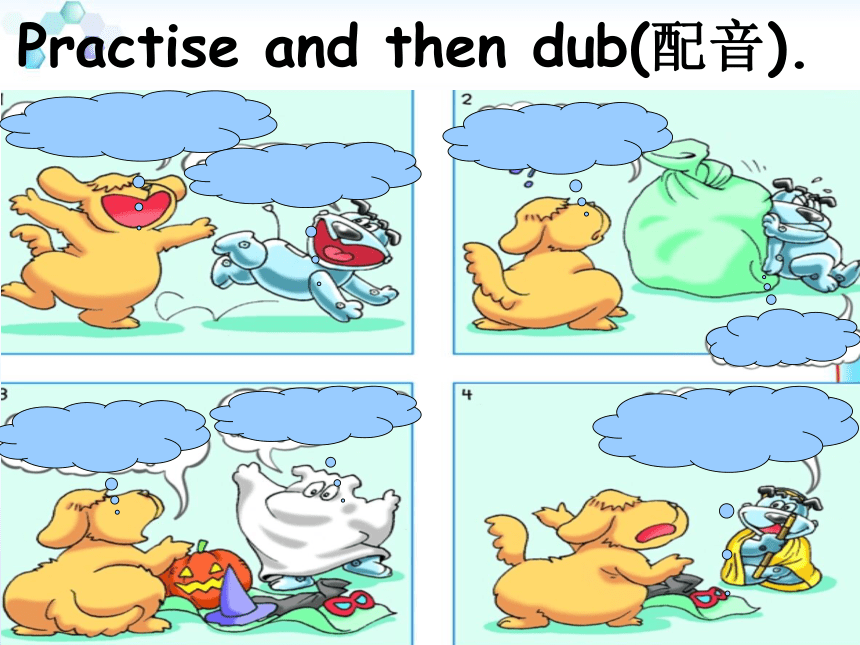
文档简介
Unit 5 Let’s celebrate!
Welcome to the unit
Which is a western(西方的) festival?
Halloween
Mid-Autumn Festival
Double Ninth Festival
National Day
October
festival [?fest?vl]
(n.) 节日
Can you
guess?
[ges]
(v.) 猜测
v. 庆祝
[?sel?breit]
Do people celebrate Halloween?
What do they do on that day?
Yes
What do people do on Halloween?
dress up
(乔装打扮)
[dres]
(v.)穿着,穿衣
What do people do on Halloween?
dress up
as a ghost
[ɡ??st]
(n.)鬼,鬼魂
What do people do on Halloween?
ask for
candies
What do people do on Halloween?
shout
“trick or treat”
What do people do on Halloween?
They _________, ___________________
and ________________.
dress up
shout “trick or treat”
ask for candies
Eddie and Hobo are talking with each other about a festival.
1) What festival are they going to celebrate?
2) What does Hobo want to
dress up as?
1)What festival are they going to celebrate?
2)What does Hobo want to dress up as?
Halloween.
A ghost or the Monkey King.
Answer the two questions:
Read after the tape.
Practise and then dub(配音).
Halloween
Mid-Autumn Festival
Thanksgiving Day
Chinese New Year
Christmas
Dragon Boat Festival
Learn more about other festivals.
People eat __________________
and watch _____________________ .
rice dumlings
dragon boat races
What do people do
at Dragon Boat Festival?
People get __________
and eat ________________for a big meal.
together
a turkey or pies
What do people do
on Thanksgiving Day?
People get _________, eat____________
and enjoy ______________.
together
moon cakes
the full moon
What do people do
at Mid-Autumn Festival?
Which festival do you like better?
Christmas
Chinese New Year
Let's read!
Read first and answer the questions with no more than four words.(答案不超过四个单词)
A tip(提示): 先看问题,然后带着问题去寻找答案(寻读法 scanning)。
1. When is Chinese New Year?
2. Who is the happiest of all?
3. What do people often eat?
Answer the questions with no more than four words.
In January or February.
The children.
Dumplings.
/ They often eat dumplings.
Let's read!
Chinese New Year is usually in January or February. Most Chinese families celebrate it.
On New Year Eve, each family will get together and have a big dinner. After dinner, people like to talk and watch TV for almost the whole night. The children?are the happiest of all because they can get red packets and nice presents from?their parents or grandparents.
At this festival, people often eat dumplings. When they meet their neighbours or friends, they'll say: “Happy New Year!”
Read first and answer the questions with no more than four words.
___________________________
_______________
______________
People get _________, have___________
and watch ____. Children can get
_____________.
together
a big dinner
TV
What do people do
at Chinese New Year?
red packets
People have ____________ and buy or get
_________for their family and friends.
a big dinner
presents
What do people do at Christmas?
Pair task: Make up a dialogue.
A: What is your favourite festival?
B: Christmas.
A: Why do you like it?
B: Because we always get a lot of nice presents at Christmas. What festival do you like?
A: I like the Mid-Autumn Festival.
B: What do you usually do on that day?
A: All my family get together and have a big dinner, eat moon cakes, and then enjoy the full moon. It's great.
Pair task: Make up a dialogue.
(以以下对话为模板,编一个对话)
A: What is your favourite festival?
B: _______________.
A: Why do you like it?
B: Because ____________________. What festival do you like?
A: I like ____________________.
B: What do you usually do on that day?
A: . It's great.
The Double Ninth Festival
It is a festival for old people.
So people usually visit their parents and grandparents on that day.
They also climb mountains and eat rice cakes at this festival.
The Double Ninth Festival
Chinese festivals
are meaningful(有意义的).
Love and enjoy
our Chinese festivals!
Homework:
1.Remember all the new words.
2.Try to find more festivals and learn more about them.
Thank you!
Bye!
Welcome to the unit
Which is a western(西方的) festival?
Halloween
Mid-Autumn Festival
Double Ninth Festival
National Day
October
festival [?fest?vl]
(n.) 节日
Can you
guess?
[ges]
(v.) 猜测
v. 庆祝
[?sel?breit]
Do people celebrate Halloween?
What do they do on that day?
Yes
What do people do on Halloween?
dress up
(乔装打扮)
[dres]
(v.)穿着,穿衣
What do people do on Halloween?
dress up
as a ghost
[ɡ??st]
(n.)鬼,鬼魂
What do people do on Halloween?
ask for
candies
What do people do on Halloween?
shout
“trick or treat”
What do people do on Halloween?
They _________, ___________________
and ________________.
dress up
shout “trick or treat”
ask for candies
Eddie and Hobo are talking with each other about a festival.
1) What festival are they going to celebrate?
2) What does Hobo want to
dress up as?
1)What festival are they going to celebrate?
2)What does Hobo want to dress up as?
Halloween.
A ghost or the Monkey King.
Answer the two questions:
Read after the tape.
Practise and then dub(配音).
Halloween
Mid-Autumn Festival
Thanksgiving Day
Chinese New Year
Christmas
Dragon Boat Festival
Learn more about other festivals.
People eat __________________
and watch _____________________ .
rice dumlings
dragon boat races
What do people do
at Dragon Boat Festival?
People get __________
and eat ________________for a big meal.
together
a turkey or pies
What do people do
on Thanksgiving Day?
People get _________, eat____________
and enjoy ______________.
together
moon cakes
the full moon
What do people do
at Mid-Autumn Festival?
Which festival do you like better?
Christmas
Chinese New Year
Let's read!
Read first and answer the questions with no more than four words.(答案不超过四个单词)
A tip(提示): 先看问题,然后带着问题去寻找答案(寻读法 scanning)。
1. When is Chinese New Year?
2. Who is the happiest of all?
3. What do people often eat?
Answer the questions with no more than four words.
In January or February.
The children.
Dumplings.
/ They often eat dumplings.
Let's read!
Chinese New Year is usually in January or February. Most Chinese families celebrate it.
On New Year Eve, each family will get together and have a big dinner. After dinner, people like to talk and watch TV for almost the whole night. The children?are the happiest of all because they can get red packets and nice presents from?their parents or grandparents.
At this festival, people often eat dumplings. When they meet their neighbours or friends, they'll say: “Happy New Year!”
Read first and answer the questions with no more than four words.
___________________________
_______________
______________
People get _________, have___________
and watch ____. Children can get
_____________.
together
a big dinner
TV
What do people do
at Chinese New Year?
red packets
People have ____________ and buy or get
_________for their family and friends.
a big dinner
presents
What do people do at Christmas?
Pair task: Make up a dialogue.
A: What is your favourite festival?
B: Christmas.
A: Why do you like it?
B: Because we always get a lot of nice presents at Christmas. What festival do you like?
A: I like the Mid-Autumn Festival.
B: What do you usually do on that day?
A: All my family get together and have a big dinner, eat moon cakes, and then enjoy the full moon. It's great.
Pair task: Make up a dialogue.
(以以下对话为模板,编一个对话)
A: What is your favourite festival?
B: _______________.
A: Why do you like it?
B: Because ____________________. What festival do you like?
A: I like ____________________.
B: What do you usually do on that day?
A: . It's great.
The Double Ninth Festival
It is a festival for old people.
So people usually visit their parents and grandparents on that day.
They also climb mountains and eat rice cakes at this festival.
The Double Ninth Festival
Chinese festivals
are meaningful(有意义的).
Love and enjoy
our Chinese festivals!
Homework:
1.Remember all the new words.
2.Try to find more festivals and learn more about them.
Thank you!
Bye!
同课章节目录
- 预备课程
- Lesson 1 Nice to meet you !
- Lesson 2 A happy family
- Lesson 3 A nice school
- Lesson 4 You look cool !
- Lesson 5 Wonderful things
- Lesson 6 Have nice food
- Lesson 7 Enjoy our days
- Lesson 8 Let's have fun !
- Unit 1 This is me
- Unit 2 Let's play sports
- Unit 3 Welcome to our school
- Unit 4 My day
- Unit 5 Let’s celebrate
- Unit 6 Food and lifestyle
- Unit 7 Shopping
- Unit 8 Fashion
